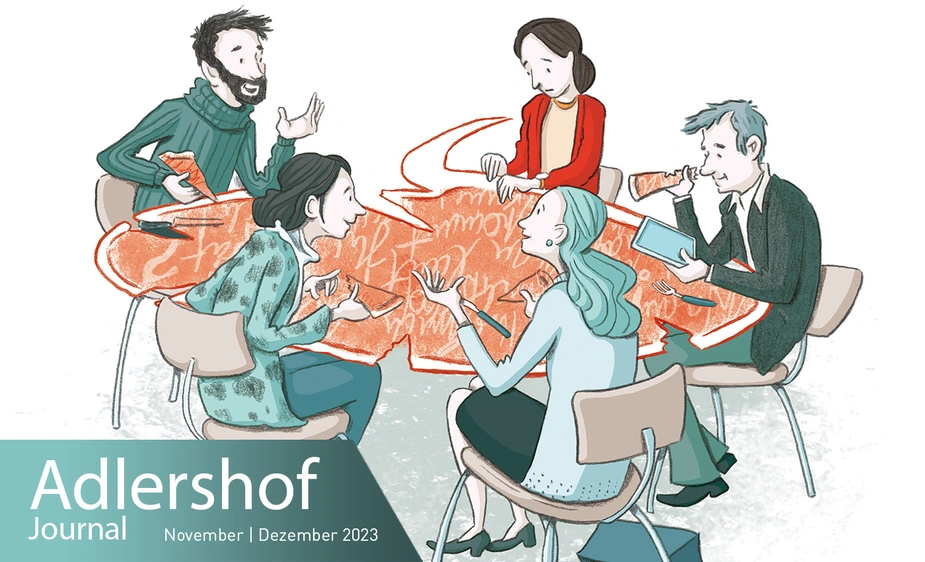That’s not what it’s about
Essay by Dilek Güngör, journalist and writer from Berlin
Vera says she won’t have time on Wednesday. Vera says she had been there every Wednesday so far, and was often the first, which was because she had the shortest way from the office to Beppo’s, she knew that. The rest of us always arrived after her and would typically finish a phone call at the front door or go to the toilet or have a chat with Beppo at the counter. And once everyone was finally sitting, Timo would be chatting away and Kristof and Ayla and Sofia, and nobody would ask Vera anything or comment on the fact that she had been there since 6 pm, which wasn’t the point really, but somehow she always left with a bad feeling because nobody really spoke to each other at that table at Beppo’s. She wouldn’t be coming this week. “Feel free to pass that on to the others.”
Sofia tells Timo that Vera is not coming to Beppo’s on Wednesday. She relays to him that Vera was annoyed that Ayla and Kristof were always late and then continued talking on the phone outside when they finally arrived. Timo remarks that wasn’t it more polite than talking at the table. “Besides, you can’t hear yourself think at Beppo’s.” Sofia said Vera was all about getting there first, even if it wasn’t what she was about.
“Vera has the shortest way,” says Timo. “And she was the one who suggested 6 pm. It’s too early for me anyway. Feel free to tell her that.”
Sofia doesn’t feel like passing on Timo’s message to Vera, especially after already relaying Vera’s message to Timo. She’s not a messenger and she will not pass on Vera’s and Timo’s messages to Alya and Kristof.
Vera isn’t there on Wednesday, like she said, but Timo and Ayla and Kristof and Sofia.
“Isn’t Vera coming?” asks Ayla.
Sofia doesn’t know how to summarise what it was that Vera said. Timo knows and says Vera felt like she wasn’t important enough to everybody.
“That’s not what she said,” says Sofia.
“She told me that we would just sit and talk past each other,” says Kristof.
“Did you talk to her?” asks Timo.
“She called me,” says Kristof. “She said she couldn’t shout across the table like we do, but she did today, and then she was happy about it, and then she got annoyed. She says she needs to be addressed directly.”
Nobody says anything, but still, there is never silence at Beppo’s. Beppo’s pub is the noisiest place in the neighbourhood. And here comes Beppo, who sits down, notepad in hand.
“Where’s Vera?” he asks.
“She’s working longer today,” says Sofia. The others look at her. “The kid of one of our colleagues has COVID, another one had to have dental surgery. There’s a deadline tomorrow, maybe she has to pull an all-nighter.” If the phone hadn’t rung, she could’ve gone on forever. But she rushes outside.
“I’ll have a pizza delivered to her office,” says Beppo.
“Great idea,” says Ayla.
Sofia returns. It wasn’t Vera on the phone but Sofia’s son wanting to know when she’s back.
“You can't have a conversation in here,” says Kristof.
“You’ll have to speak louder then,” says Timo.
Kristof says nothing. Timo is talking about his colleague, Sofia about her son, and Ayla has her mouth full of hors d'oeuvre, tomato bread.
The next morning, Vera calls Sofia and asks which one of them had a pizza delivered to her office.
“You knew I wouldn’t be there after six.”
Sofia says she didn’t have anything delivered. “Maybe one of the others?”
“Don’t you ever speak to each other?”
Dilek Güngör is a Berlin-based journalist and writer. Her novel “Vater und ich” was published by Verbrecher Verlag.
